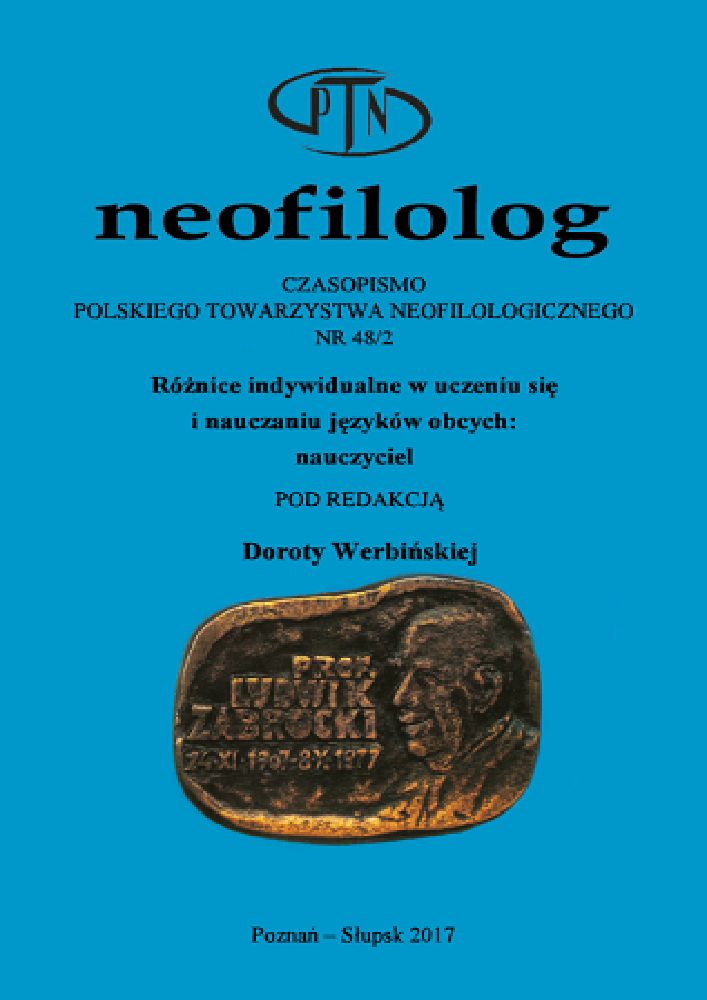Abstract
The article concerns pre-service English language teacher training and discusses some results of an on-going action research project, the aim of which is to investigate a way of supporting student reflection while they do obligatory teaching practice in Polish state schools. The paper presents the design of the “Develop by Blogging” intervention, as well as its pilot implementation. Preliminary findings suggest that the intervention has the potential to create time and space for reflection on individual professional experience and can constitute a chance for enhancing reflection among pre-service teachers.References
Brown, A. H. i T. D. Green. 2016. The essentials of instructional design: Connecting fundamental principles with process and practice. New York: Routledge.
Cherry, N. 2002. Action Research: a pathway to action, knowledge and learning. Melbourne: RMIT University Press.
Conole, G. 2012. Designing for learning in an open world. Dordrecht: Springer.
Creswell, J. W. 2013. Projektowanie badań naukowych. Metody jakościowe, ilościowe i mieszane. Kraków: Wydawnictwo Uniwersytetu Jagiellońskiego.
Czura, A. 2014. „Wprowadzenie”. Neofilolog, 43(1): 5-6.
Farrell, T. S. 2007. Reflective language teaching: From research to practice. London: Continuum.
Fisher, L. i D. Kim 2013. „Two approaches to the use of blogs in pre-service foreign language teachers’ professional development: a comparative study in the context of two universities in the UK and the US”. The Language Learning Journal, 41(2): 142-160.
Gabryś-Barker, D. 2012. Reflectivity Pre-service Teacher Education: A Survey of Theory and Practice. Katowice: Wydawnictwo Uniwersytetu Śląskiego.
Garza, R. i S. F. Smith. 2015. „Pre-service teachers’ blog reflections: Illuminating their growth and development”. Cogent Education, 2: 1066550. http://www.tandfonline.com/doi/full/10.1080/2331186X.2015.1066550 DW 09.07.2017.
Gay, L. R., Mills, G. E. i P. W. Airasian. 2011. Educational research: Competencies for analysis and applications. Upper Saddle River: Pearson Education.
Górecka, J. i A. Nowicka 2015. „Uczenie się w interakcjach argumentacyjnych a tożsamość ucznia jako rozmówcy”. Lingwistyka Stosowana, 14: 41-55.
Jodłowiec, M. 2005. „Developing a Reflective Practitioner: A Teacher Educator’s Perspective”. (w) Studies in Teacher Education: Language, Literature, and Culture. (red. M. Misztal i M. Trawiński). Kraków: Wydawnictwo Naukowe Akademii Pedagogicznej, str. 9-16.
Killeavy, M. i A. Moloney. 2010. „Reflection in a social space: Can blogging support reflective practice for beginning teachers?”. Teaching and Teacher Education, 26(4): 1070-1076.
Kolb, D. 1984. Experiential Learning. Englewood Cliffs, New York: Prentice Hall.
Komorowska, H. 2015. „Rozwój glottodydaktyki a kształcenie nauczycieli języków obcych”. Postscriptum Polonistyczne, 2(16): 11-29.
Luik, P., Voltri, O., Taimalu, M. i K. Kalk. 2011. „On the use of student teacher blogs during teaching practice”. Procedia-Social and Behavioral Sciences, 11: 165-169.
Mor, Y. i B. Craft. 2012. „Learning design: reflections upon the current landscape”. Research in learning technology, 20 (sup1): 19196.
Mor, Y. i O. Mogilevsky. 2013. „The learning design studio: collaborative design inquiry as teachers’ professional development”. Research in Learning Technology, 21(1): 22054.
Schön, D. A. 1983. The reflective practitioner. How professionals think in action. New York: Basic Books.
Stiler, G. M. i T. Philleo. 2003. „Blogging and blogspots: An alternative format for encouraging reflective practice among preservice teachers”. Education, 123(4): 789-797.
Yang, S. H. 2009. „Using blogs to enhance critical reflection and community of practice”. Educational Technology & Society, 12(2): 11-21.
Wilczyńska, W. i A. Michońska-Stadnik. 2010. Metodologia badań w glottodydaktyce: Wprowadzenie. Kraków: Avalon.
Wygotsky, L. S. 1971. Wybrane prace psychologiczne. Warszawa: Państwowe Wydawnictwo Naukowe.
Zawadzka-Bartnik, E. 2014. „Refleksja w zawodzie nauczyciela – założenia a realne możliwości realizacji”. Neofilolog, 43(1): 7-23.
Netografia
http://developbyblogging.weebly.com DW 09.07.2017
https://elsbetha.wordpress.com/2016/03/02/the-solution/#comments DW 09.07.2017
https://pollytheteacher.wordpress.com DW 09.07.2017
http://sjp.pwn.pl/sjp/refleksja;2573649.html DW 09.07.2017
https://wordpress.com DW 09.07.2017
http://www.edmodo.com DW 09.07.2017
http://www.tesol.org DW 09.07.2017
License
Copyright (c) 2017 Joanna Pitura

This work is licensed under a Creative Commons Attribution-NoDerivatives 4.0 International License.
Authors
Authors of texts accepted for publication in Neofilolog are required to complete, sign and return to the Editorial team’s office the Agreement for granting a royalty-free license to works with a commitment to grant a CC sub-license.
Under the agreement, the authors of the texts published in Neofilolog grant Adam Mickiewicz University in Poznań a non-exclusive, royalty-free license and authorize the use of Attribution-NoDerivatives 4.0 International (CC BY-ND 4.0) Creative Commons sub-license.
The authors retain the right to the free disposal of the work.
Users
Interested Internet users are entitled to use works that have been published in Neofilolog since 2017, under the following conditions:
▪ attribution – obligation to provide, together with the distributed work, information about the authorship, title, source (link to the original work, DOI) and the license itself.
▪ no derivatives – the work must be preserved in its original form. Without the author's consent, it is not possible to distribute the modified work in the form of translations, publications, etc.
Copyrights are reserved for all texts published since 2017.
Miscellaneous
Adam Mickiewicz University in Poznań retains the property right as a whole (layout, graphic form, title, cover design, logo etc.).
